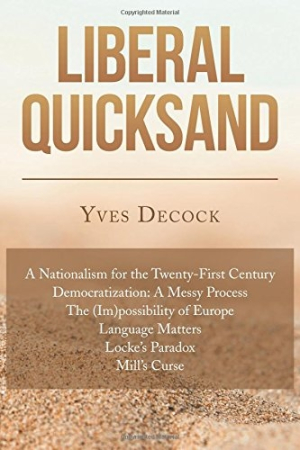Liberal Quicksand
A Nationalism for the Twenty-First Century
Decock is an intellectual up to the task of challenging some of our most cherished notions of democracy.
Yves Decock’s compelling disquisition, Liberal Quicksand, will be a hard pill to swallow for lovers of liberal democracy. But in light of increased sectarian violence around the globe, such substance may be necessary in order to better understand shortcomings in idealistic assumptions about self-governance and cooperation.
Decock, a Belgian writer specializing in philosophy, shows erudite command of complex political thought as well as a comprehensive grasp of world history. The book’s central concern is the paradoxical nature of Lockean democracy—the political system touted by the West that is based on popular vote, i.e., one person equals one vote. Analyzing the political developments of the nineteenth-century Hapsburg and Ottoman empires and modern Europe and America, the book argues that without proper balance, liberal democracy often leads to the dominance of the majority population, to the detriment of minorities.
Most surprising and refreshing is the book’s revision of the concept of nationalism. Multiculturalists have a tendency to associate nationalist ideals with the racist horrors of Nazism and cultural imperialism. Decock, however, makes the case that nationalism—that is, self-determination for distinct ethnic and linguistic populations—is important for the underlying stability of pluralism. The book uses modern Europe as an example. A united, federalist Europe may work only because strong, self-identifying nations have already been formed and are willing to give up some autonomy for a greater collective.
In contrast, balkanization occurs if distinct populations don’t have sufficient cultural and political institutions of their own—some degree of nationalism—with which to join a greater federation. Decock convincingly points to post-invasion Iraq as an example where liberal democracy failed to unite majority and minority constituents. Popular democracy in modern Egypt similarly led to sectarianism.
Most of the work is aptly cited. Major historical and political scholars, such as Francis Fukuyama and Arthur Schlesinger Jr., are referenced in discussions of democratic government and minority rights, including a thorough exposition of systemic racism and minority disenfranchisement in America.
The book overreaches, however, by emphasizing language as the primary driver of national identity. Comparisons between modern multilingualism in the U.S. and linguistic divisions in past European empires strain the contexts of both into a pessimistic view of multiculturalism and a more positive view of separatism. Decock never adequately addresses how globalization and technology have integrated nationalist identities on an unprecedented level. Multilingualism may reflect exigencies of the global marketplace more than liberal political programs.
What Liberal Quicksand lacks in solutions—it really doesn’t offer any other than a repetitive impulse toward federalism—it makes up for in sheer provocation. It is a work of political critique. Decock is an intellectual up to the task of challenging some of our most cherished notions of democracy. At the very least, he shows how idealistic naiveté can actually undermine tenets of self-governance and political equality. Political scientists and historians may find Decock’s contributions to contemporary political thought worthwhile.
Reviewed by
Scott Neuffer
Disclosure: This article is not an endorsement, but a review. The publisher of this book provided free copies of the book and paid a small fee to have their book reviewed by a professional reviewer. Foreword Reviews and Clarion Reviews make no guarantee that the publisher will receive a positive review. Foreword Magazine, Inc. is disclosing this in accordance with the Federal Trade Commission’s 16 CFR, Part 255.

